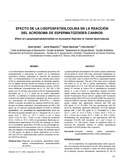Mostrar el registro sencillo del ítem
Efecto de la lisofosfatidilcolina en la reacción del acrosoma de espermatozoides caninos
| dc.rights.license | http://creativecommons.org/licenses/by-nc-sa/3.0/ve/ | |
| dc.contributor.author | Santiani, Alexei | |
| dc.contributor.author | Risopatrón, Jennie | |
| dc.contributor.author | Sepúlveda Becker, Néstor | |
| dc.contributor.author | Sánchez, Raúl | |
| dc.date.accessioned | 2009-05-07T16:13:53Z | |
| dc.date.available | 2009-05-07T16:13:53Z | |
| dc.date.issued | 2009-05-07T16:13:53Z | |
| dc.identifier.issn | 0798-2259 | |
| dc.identifier.uri | http://www.saber.ula.ve/handle/123456789/28122 | |
| dc.description.abstract | Los lisofosfolípidos desestabilizan la membrana plasmática del espermatozoide y promueven su fusión con la membrana acrosómica externa, acelerando la reacción del acrosoma (RA). La lisofosfatidilcolina (LC) ha sido utilizada para inducir la RA en espermatozoides capacitados de diferentes mamíferos. El objetivo de este estudio fue evaluar el efecto de la LC en la inducción de la RA en espermatozoides caninos. Se utilizaron diferentes concentraciones de LC (0, 100, 200 y 300 µg/mL) por 15 minutos para inducir la RA en espermatozoides incubados por 0, 3 y 4 horas en un medio capacitante (mCCM). La vitalidad y el estado acrosomal se determinó por la técnica de doble fluorescencia Aglutinina de Pisum sativum con Isotiocianato de Fluoresceína (PSA-FITC) y Hoechst 33258. La prueba de análisis de varianza (ANOVA) fue utilizada para el análisis estadístico. Concentraciones de 200 y 300 µg/mL de LC reducen significativamente (P<0,05) la vitalidad espermática. Los porcentajes de espermatozoides vivos con RA entre los grupos tratados con 0 y 100 µg/mL de LC a las 0 horas (21,0 ± 4,2% vs. 21,0 ± 6,6%), a las 3 horas (43,8 ± 4,7% vs. 49,1 ± 5,2%) y a las 4 horas de incubación (51,3 ± 14,8% vs. 57,6 ± 9,9%) no presentaron diferencias estadísticamente significativas (P>0,05). Sin embargo, se observó un incremento significativo (P<0,05) en los porcentajes espermatozoides vivos reaccionados a las 3 y 4 horas de incubación con respecto a los incubados 0 horas. Se concluye que la LC (100 µg/mL) no ejerce un efecto significativo en la inducción de la RA en espermatozoides caninos incubados en medio mCCM sin glucosa. | es_VE |
| dc.rights | info:eu-repo/semantics/openAccess | |
| dc.subject | Reacción de acrosoma | es_VE |
| dc.subject | Capacitación espermática | es_VE |
| dc.subject | Lisofosfatidilcolina | es_VE |
| dc.subject | Espermatozoides de canino | es_VE |
| dc.title | Efecto de la lisofosfatidilcolina en la reacción del acrosoma de espermatozoides caninos | es_VE |
| dc.title.alternative | Effect of Lysophosphatidylcholine on acrosome reaction in canine spermatozoa | es_VE |
| dc.type | info:eu-repo/semantics/article | |
| dc.description.abstract1 | Lysophospholipids desestabilize the sperm plasma membrane and promote its fusion with outer acrosomal membranes, by accelerating acrosome reaction (RA). Lysophosphatidylcholine (LC) has been used to induce the RA on capacitated sperms from different mammals. The aim of this work was to evaluate the effect of LC on RA in canine spermatozoa. Different concentrations of LC (0, 100, 200 and 300 µg/mL) were utilized during 15 minutes to induce RA in spermatozoa incubated during 0, 3 and 4 hours in capacitation medium (mCCM). Sperm viability and acrosomal status were determined using double fluorescence Pisum sativum aglutinin with fluorescein isothiocyanate (PSA-FITC) and Hoechst 33258 The analysis of varience (ANOVA) test was utilized for statistical analysis. The sperm viability was significantly reduced with 200 and 300 µg/mL of LC (P<0.05). The live spermatozoa with RA show no statistically significant differences (P>0.05) between groups with 0 and 100 µg/ml of LC incubated to 0 hour (21.0 ± 4.2% vs. 21.0 ± 6.6%), 3 hours (43.8 ± 4.7% vs. 49.1 ± 5.2%) and 4 hours (51.3 ± 14.8% vs. 57.6 ± 9.9%).Nevertheless the percentage of live spermatozoa with RA increased (P<0.05) with incubation at 3 and 4 hours. In conclusion, LC (100 µg/mL) shows no significant effect for inducing the acrosome reaction in canine spermatozoa incubated in mCCM mediun free of glucose. | es_VE |
| dc.description.colacion | 311 - 316 | es_VE |
| dc.description.frecuencia | Bimestral | |
| dc.identifier.depositolegal | 199102ZU46 | |
| dc.subject.institucion | Universidad del Zulia (LUZ) | es_VE |
| dc.subject.institucion | Universidad de Los Andes (ULA) | es_VE |
| dc.subject.keywords | Acrosome reaction | es_VE |
| dc.subject.keywords | Sperm capacitation | es_VE |
| dc.subject.keywords | Lysophosphatidylcholine | es_VE |
| dc.subject.keywords | Canine spermatozoa | es_VE |
| dc.subject.publicacionelectronica | Revista Científica | |
| dc.subject.tipo | Revistas | es_VE |
| dc.type.media | Texto | es_VE |
Ficheros en el ítem
Este ítem aparece en la(s) siguiente(s) colección(ones)
-
Revista Científica - 2004 - Vol XIV - No. 004
julio - agosto



